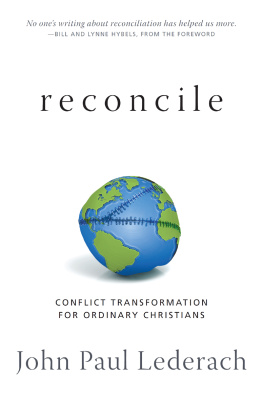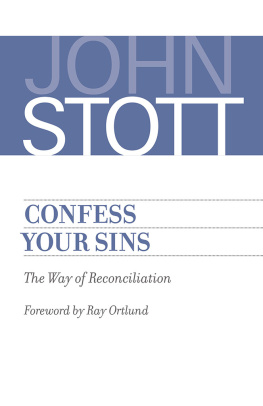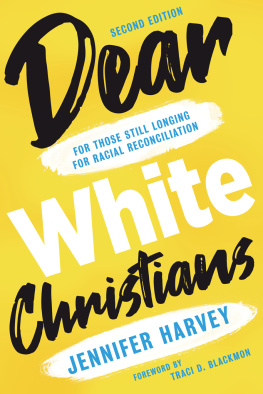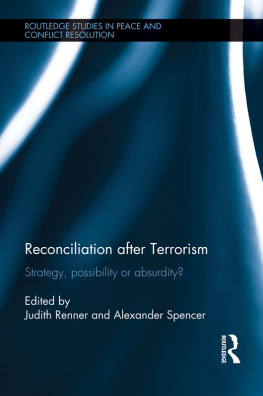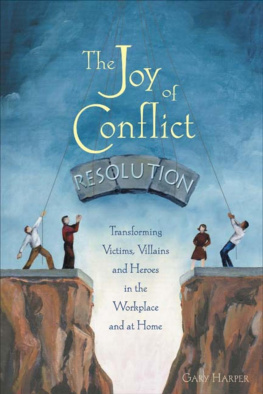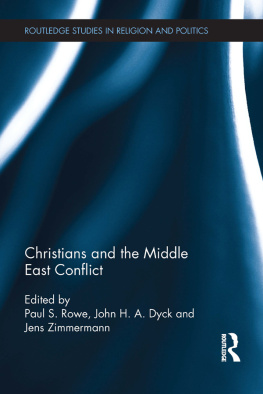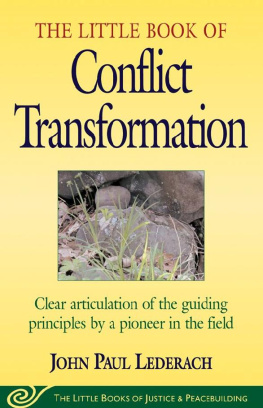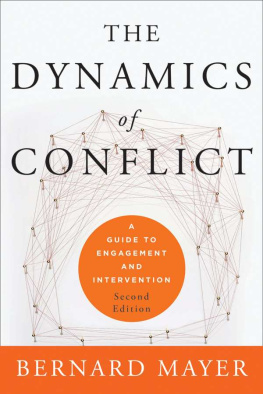reconcile
John Paul Lederach calls each of us to peacemaking that is active, practical, and redemptive. He effectively demonstrates that reconciliation is not passive or optional in the life of believers.
Dale Hanson Bourke, author of The IsraeliPalestinian Conflict
A profoundly moving and inspiring book! John Paul Lederachs call to dream boldly and to act with enthusiastic pragmatism merits being taken seriously by pastors, students, and practitioners in the field.
Piet Meiring, former member of the South African Truth and Reconciliation Commission
As more Christians become aware and engaged in global conflicts, it becomes easy to choose sides. This timely book by Lederach reminds us that our call is to transcend conflict and bring transformation and reconciliation to all those involved.
Sami Awad, founder and executive director, Holy Land Trust
Lederach waters the dream of reconciliation in our theological garden, compelling us to transform conflict as part of the Christian mission. With decades of experiments putting hands and feet on pacifist Christian theology, Lederach gives us a pragmatic guide for loving our enemiesat home and far away.
Lisa Schirch, director of human security, Alliance for Peacebuilding
In this deeply important and beautifully written book, John Paul Lederach offers a path to peace borne out of wisdom gained from years of experience both locally and globally. For those seeking reconciliation and peace among their families, churches, communities and, yes, countries, this is a mustread!
Randy Newcomb, president and CEO, Humanity United
With Reconcile, John Paul Lederach reminds Christians anew of what it means to be vulnerable and therefore practically Christian in a world full of conflict. If you believe that all Christians are foremost ambassadors of reconciliationno matter their vocation or locationthen this book will practically prepare you for the transformation that comes with a journey that is also the destination.
Chris Seiple, president, Institute for Global Engagement
Reconcile equips its readers to deal with conflict within a solid biblical framework and with practical tools and skills. The additional material and list of readings from other skilled leaders only makes this book even more valuable. Highly recommended for anyone interested in approaching conflict and building reconciliation from a Christian point of view.
Robert Schreiter, author of The Ministry of Reconciliation: Spirituality and Strategies
[John Paul Lederachs writing] was central to me and to many of my friends and students in the rediscovery of reconciliation as the mission of God and the calling of Christians.
Tom Porter, executive director of the religion and conflict transformation program, Boston University School of Theology

Library of Congress Cataloging-in-Publication Data
Lederach, John Paul.
Reconcile : conflict transformation for ordinary Christians / John Paul Lederach.
pages cm
ISBN 978-0-8361-9903-1 (pbk. : alk. paper) 1. Conflict management
Religious aspectsChristianity. 2. ReconciliationReligious aspects
Christianity. I. Title.
BV4597.53.C58L46 2014
248.86--dc23
2014011694
Reconcile: Conflict Transformation for Ordinary Christians is the revised edition of The Journey Toward Reconciliation, published by Herald Press in 1999.
Copyright 2014 by Herald Press, Harrisonburg, Virginia 22802
Released simultaneously in Canada by Herald Press,
Kitchener, Ontario N2G 3R1. All rights reserved.
Library of Congress Control Number: 2014011694
International Standard Book Number: 978-0-8361-9903-1
Printed in United States of America
Cover and interior design by Merrill Miller
Cover photo: composite image by Merrill Miller using photographs from iStockphoto/Thinkstock
A version of for information.
Unless otherwise indicated, Scripture quotations are from the New Revised Standard Version Bible, copyright 1989, Division of Christian Education of the National Council of the Churches of Christ in the United States of America. Used by permission. All rights reserved.
To order or request information, please call 1-800-245-7894 in the U.S. or 1-800-631-6535 in Canada. Or visit www.heraldpress.com.
18 17 16 15 14 10 9 8 7 6 5 4 3 2 1
Wendy and I dedicate this book to our parents,
John M. and Naomi K. Lederach
and Omer and Mary Liechty,
from whom we have found
guidance, sustenance, and love
for the lifelong faith journey.

Foreword
I N MY SERMON on December 8, 2013, I (Bill) claimed that there will come a day when B1 bombers will be used exclusively to drop food and emergency supplies in the aftermath of earthquakes and tsunamis; when aircraft carriers will become floating hospitals serving refugees and other vulnerable people; and when the combined military budgets of all the countries of the world will be devoted to improving life rather than multiplying death.
My paraphrased version of Isaiahs great vision of swords beaten into plowshares drew applause from my congregation. In our hearts we were celebrating together a future day when Nation will not take up sword against nation, nor will they train for war anymore (Isaiah 2:4). A day when war colleges will be replaced by peace colleges. A day when the greatest minds, the most creative thinkers, and the purest of heart will be working togetherstrategically, courageously, and persistentlyto wage peace. In the greatest sermon of all time, Jesus says, Blessed are the peacemakers (Matthew 5:9). And we think he meant it!
But the world seems not to have caught on. According to Lederach, there have been 236 active wars in 150 countries just since World War II. And theyve shattered millions of lives. I (Lynne) recently returned from Jordan, where I sat stunned and silent as Syrian refugees told stories of inconceivable violence and death. There are no children left in Syria, one woman said. Even a four-year-old can describe war and brutality. That is not childhood. That war, and so many others, rage as we write.
Sadly, most American evangelicals have been quicker to vote for war than to wage peace. We say that not as accusation but as confession. For four decades God has trusted us with Christian leadership, but only in recent years have we opened our eyes, minds, and hearts to the biblical call to peacemaking and reconciliation. God, forgive us.
In addition to the clear biblical mandate for learning the things that make for peace (Luke 19:42), we have been drawn to peacemaking for very pragmatic reasons. We have seenup closethe destructive impact of war. Along with many American churches, we have become increasingly engaged with vulnerable people throughout the world. Called to extend mercy and act justly, we have walked with indigenous local Christians as they have become the hands and feet of Christ in their communitiesand we have rejoiced over what they have accomplished! But too often, we later grieved as their progress was destroyed in the path of violent conflict. From the body of a tiny child to the infrastructure of an entire countryweve seen war wipe out everything. If we care about the vulnerable people of the world, we must care about peace.

